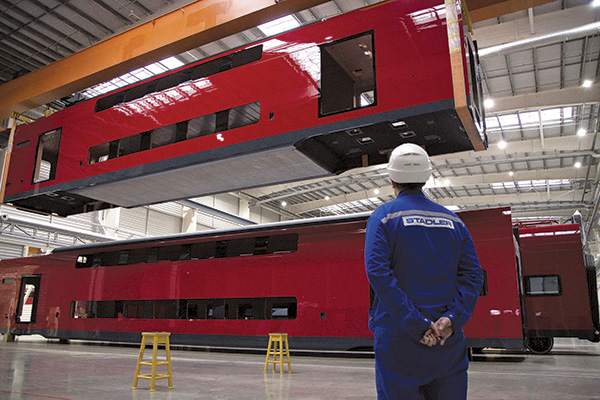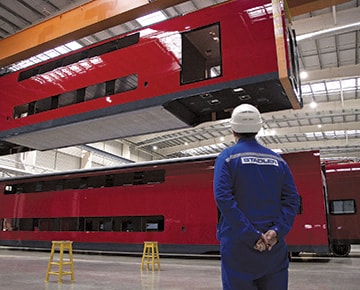Council of Ministers approves draft programme for Government’s action in coming five years
The Economy Minister — Vladimir Zinovsky — presented the document at the Council of Ministers’ Presidium sitting. According to him, the Government’s strategic priority will focus on restoration of the balanced economic growth to enhance Belarusians’ quality of life. This will be connected with a systematic increase of the economic competitiveness and reduction of its dependence on the foreign market situation.

In 2016, Stadler plans to invest 4-5m Euros into its plant in Fanipol, near Minsk
The programme envisages three basic conditions of the economic policy: provision of the macroeconomic balance, increase of gold-and-currency reserves to the minimal possible secure level and debt-free financing of the country’s payment balance. Gradual payment of existing foreign debts is also outlined.
The further achievement of these priorities is based on realisation of a complex consequent measures which are divided into five major blocks in the programme. The first block includes measures aimed at restoration of the industrial complex’s competitiveness. To meet the goal, a stage-by-stage reduction of cross-subsidisation until late 2018 is envisaged, in addition to reduction of interest rates in the economy and cutting of directive crediting and inflation. A focus will be made on the pure profit as a key indicator of companies’ effective work, as well as concentration of support on exports of investment products and systematic strengthening of corporate management. The programme envisages development of a strategy to enhance efficiency at companies with a state property share, in addition to realisation of an active innovative strategy.
The second block of systematic issues deals with reduction of costs and restructuring of the energy and communal-and-housing economy. In particular, it’s planned to cut costs of monopolies, while introducing a transparent division of expenses, their registration upon the types of activity and division of functions of a customer and a contractor. These measures will be realised jointly with reduction of prime cost and cross-subsidising and growth of the targeted social support. A key task for 2016 is to introduce targeted non-cash subsidies to pay for housing-and-communal services.
The third block of measures envisages creation of new jobs and development of small and medium-sized businesses. Small entrepreneurship subjects will receive financial support via special banking products — including micro-credits, realistaion of a Development Bank’s programme for small and medium-sized businesses and attraction of money from international financial organisations (primarily, the World Bank and the European Bank for Reconstruction and Development).
The fourth block of measures deals with infrastructure and the construction complex. Special attention will be paid to possibilities of realising projects dealing with infrustructure development on principles of the public private partnership.
The fifth block of measures ensures a strong social avenue of the programme. These measures proceed from the targeted character of this support and realisation of social programmes to enhance the quality of people’s life.
Apart from the above mentioned, the programme of the Government’s activity includes systematic issues of the export strategy improvement. It envisages export diversification via the distribution of export flows between the EU, the Eurasian Economic Union and other countries (in proportion of one-third/one-third/one-third), the enhancement of efficiency of the system of export supwport, the development of economic integration, the use of possibilities of intensification of the trade-economic co-operation with the EU, China and countries of the far arc.
As regards the investment policy, the enhancement of efficiency of use of resources and payback for each Rouble of investments are the priority. Privileged credits on investment projects will be allocated upon a tender, during state programme realisation. It’s supposed that the Development Bank will become a single canal of crediting — except for accommodation construction and acting activity of the agro-industrial complex. The credit model of the investment process should transform into a model on the basis of direct foreign investments.
A separate block of issues includes the system of state management and regional policy which outline the following topical positions: reduction of the number and duplication of functions of ministries and agencies; distribution of authorities of an owner and the regulator; motivation of state officers.
Actually, the programme of the Government’s activity is an integral part of a single package of programme documents for the coming five years. It is closely connected with fulfilment of the twenty state programmes of branches and spheres of activity, as well as the programme of the country’s social-economic development until 2020.
“The draft programme is prepared proceeding from a strategic priority of restoring a balanced economic growth and enhancement of the population’s life standards. It’s planned to begin forming a new economic structure in the coming five years which would ensure the country’s economic independence. Simultaneously, a private initiative should develop,” Prime Minister Andrei Kobyakov notes. According to him, the work will be based on principles of the personal responsibility of all Governmental members for the final result and openness of their activity.
By Vladimir Khromov











